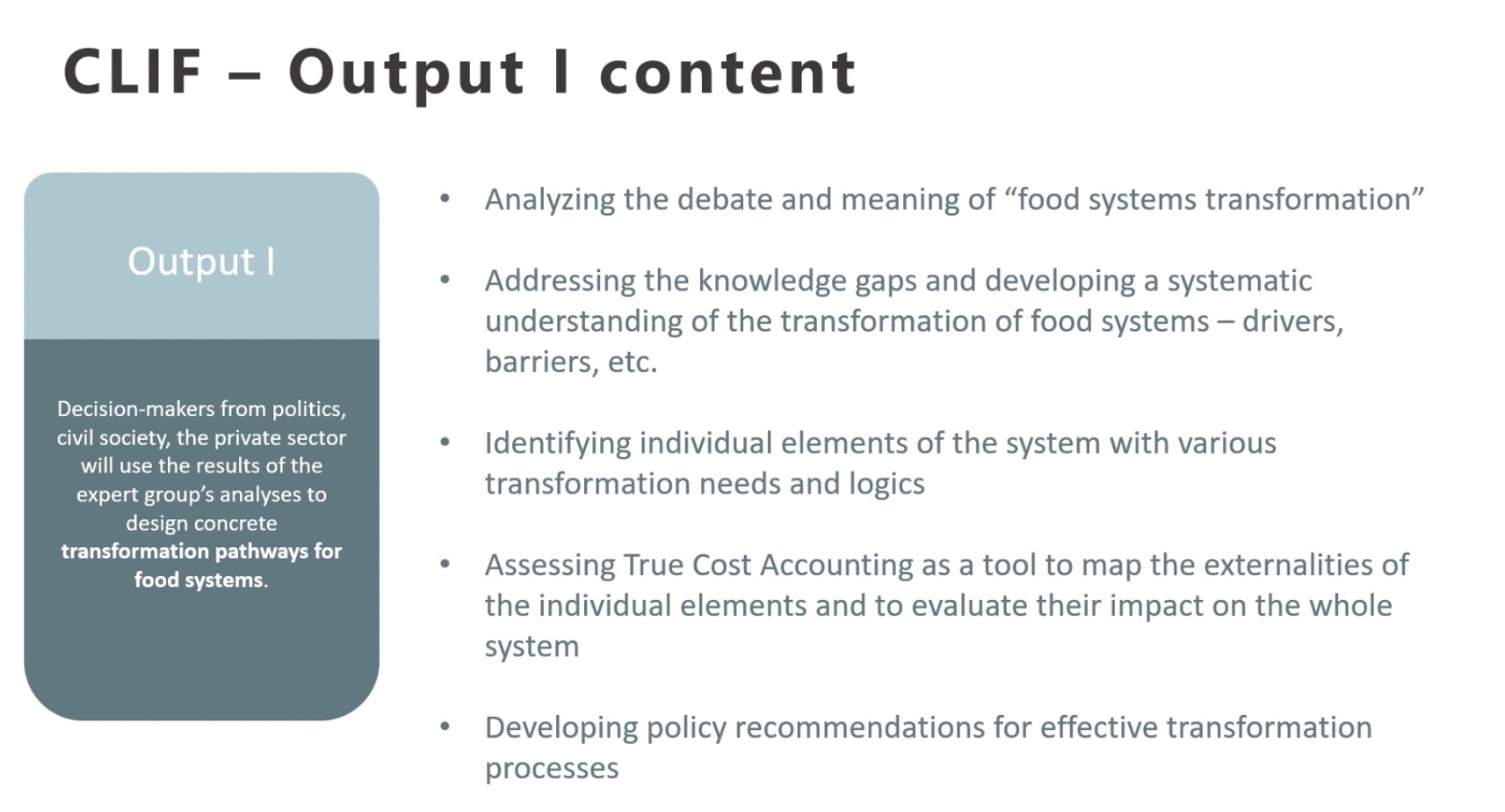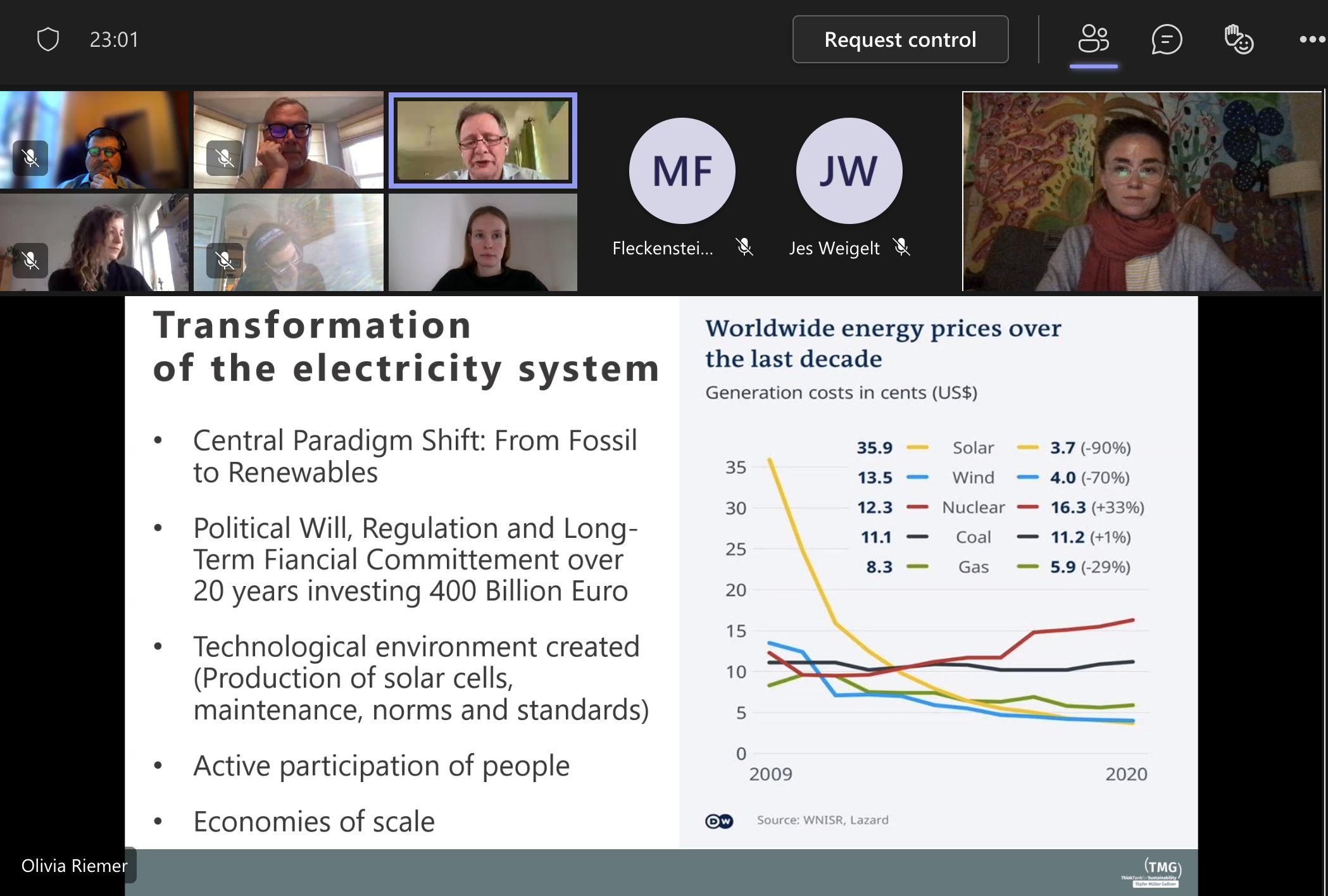Food systems transformation: towards a common understanding
TMG Research convenes expert group to kick off new research project on food systems transformation
by Sarah Zitterbarth | 2022-03-21

On 22 February, TMG convened the first of a series of expert meetings under the collaborative research project, Assessment and Communication of Climate Impacts of Food (CLIF).
The term "food systems transformation" is increasingly ubiquitous in literature as well as dialogue processes on advancing food security and sustainable development. There is, however, no common understanding of what transformation actually means, nor how it can be achieved in concrete terms.

The TMG-led component of the CLIF project aims to develop a systematic understanding of the state of debate of food systems transformation. In addition to identifying key actors, discourses, drivers, and opportunities, the project will explore political and institutional factors that encourage, or hamper, more transformative pathways. Insights gained from this research phase will be packaged into recommendations for political decision-makers, consumer organisations, businesses, and other stakeholders in food systems transformation.
Opening the expert meeting, Alexander Müller, TMG Managing Director, highlighted two key challenges that our generation needs to solve: the way we produce energy, and the way we produce and consume food. Drawing on the example of Germany's energy transition, he outlined what this tells us about the critical steps for achieving the transformation of food systems.

One of the core lessons learnt from Germany's green energy transition is the critical role of bold and determined political leadership in realising paradigm shifts. This could not be more relevant in today's geopolitical context. The expert workshop took place just days before Russia’s attack on Ukraine, underscoring the critical need to decarbonise Europe's energy systems and end its dependence on Russian oil and gas.
Müller identified further parallels with our unsustainable food systems, which are heavily reliant on synthetic fertilisers exracted from natural gas. He cautioned that compared to the relatively clear cut goals of the energy transition - which seeks to move away from fossil fuels to renewable energies - transforming food systems is a much more complex undertaking.
Unpacking food systems transformation
Guided by a scoping study prepared for the meeting, participants delved into possible leverage points for reforming global food systems towards more sustainability and resilience. They noted that attempts to agree on common transformation pathways are undermined by the current polarisation between technology- and capital-driven approaches, and more contextualised and bottom-up approaches, such as agroecology. The expert meeting stressed the importance of focusing analysis on the governance of food systems in order to find entry points for reform at multiple governance levels. To this end, the TEEBAgriFood (The Economics of Ecosystems and Biodiversity for Agriculture and Food) framework was proposed as a practical tool for undertaking such comprehensive analysis.
The outcome of the expert meeting will feed into a preliminary report that will be discussed at an international conference organised by WWF in the context of the 50-year anniversary of the first global environmental conference (Stockholm +50).
 Urban Food FuturesFeb 09, 2026
Urban Food FuturesFeb 09, 2026Pushing the horizon: Urban farming and community-led innovation in Mukuru informal settlement
A small community-run greenhouse in Mukuru is offering insights into how controlled-environment agriculture can strengthen food security in urban environments under increasing pressure—and a look into the future of food systems in informal settlements.
Christian Sonntag, Emmanuel Atamba, Lumi Youm
 Land GovernanceDec 18, 2025
Land GovernanceDec 18, 2025Land tenure, women’s land rights, and resilience: Reflections from CRIC23 toward UNCCD COP17
Our experts discuss what the exchanges at CRIC23 highlighted and revealed about the role of secure and gender-equitable land tenure in the UNCCD's work ahead of the 2026 triple COP year.
Frederike Klümper, Washe Kazungu
 Urban Food FuturesDec 09, 2025
Urban Food FuturesDec 09, 2025The story of Mukuru's Urban Nutrition Hub
In Mukuru informal settlement, a safe haven for women has grown into the Urban Nutrition Hub, a multi-purpose space for nutrition education, training, and community development, demonstrating the potential of grassroots community-owned innovation..
Serah Kiragu-Wissler


